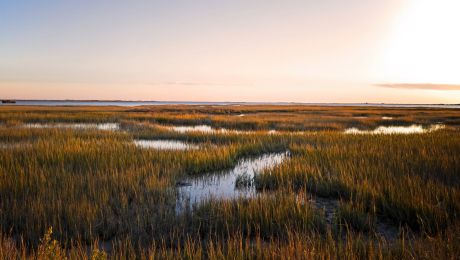
Extent of future warming will dictate impacts, according to research involving a Rutgers scientist.
The rapid sea level rise and resulting retreat of coastal habitat seen at the end of the last Ice Age could repeat itself if global average temperatures rise beyond certain levels, according to an analysis by an international team of scientists from more than a dozen institutions, including Rutgers.
In a study published in Nature, where RCEI Affiliate Bob Kopp is a co-author, reports how ancient coastal habitats adapted as the last glacial period ended more than 10,000 years ago and projected how they are likely to change with this century’s predicted sea level rise. They conducted their analysis by examining the ocean sediments of ancient shorelines from a time when oceans rose rapidly, mainly because of melting ice sheets in the Northern Hemisphere. This examination allowed them to infer how ancient coastal habitats changed and formed the basis of improved predictions about the present.
Read the full article at Rutgers Today.







